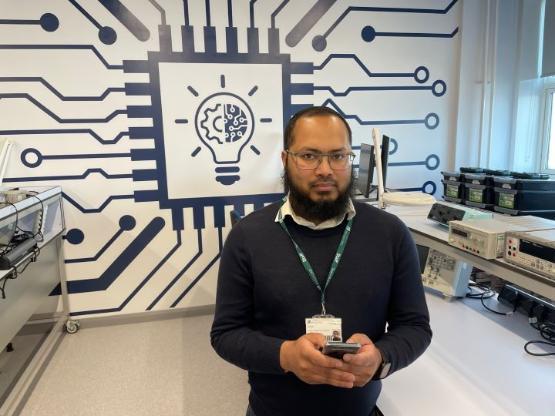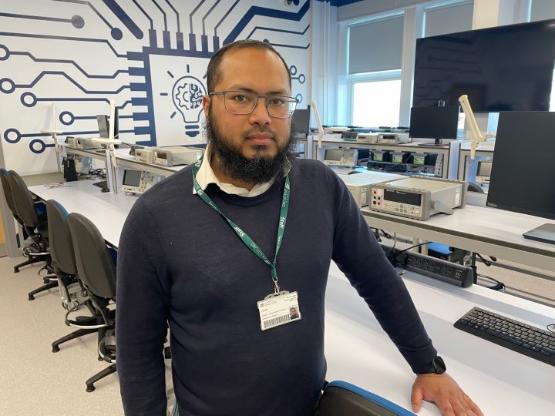Safety warning over smart technology in people’s homes
The potential safety dangers of smart technology found in people’s homes has been highlighted by researchers at the University of Bradford.

The Internet of Things (IoT), a network of internet-connected smart devices used in homes, have become a part of everyday life.
But such technology, including smart speakers, smart plugs, smart kitchen appliances and video doorbells, can be vulnerable to cyber-attacks and cause damage, such as fire, in people’s homes.
Dr Sohag Kabir, Associate Professor at the University of Bradford’s School of Computer Science, Artificial Intelligence and Electronics, and his team are researching how to make people’s digital world more safe and secure.
He said: “You can control everything in your smart home from your mobile phone through different apps.
"This is the emerging world of the internet of things. We are trying to make these things [smart technology] safer.
“Companies of smart technology focus on the function and not what could go wrong. Safety and security take a backseat.”

What is the Internet of Things?
It is a network of devices including smart speakers, light bulbs, TVs, locks, thermostats and video doorbells.
Smart devices can be monitored and controlled remotely by the homeowner through apps on their mobile phone.
Wearable IoT devices, such as smart watches, fitness trackers and smart insulin pens, are used in healthcare for medical practitioners to monitor a patient’s health via data such as heartrate without seeing them in person.
Safety concerns
Despite the positive side of smart technology, Dr Kabir and his team warn of potential issues over security, reliability and safety.
Hardware, software and communication failures can occur randomly, posing serious risks to users. For example, smart homes could experience fire caused by overheating if thermostats, controlled via smart devices, malfunction.
Such devices found in the home are vulnerable to cyber-attacks due to their limited processing capabilities, making them ‘low hanging fruits and easy targets’ for hackers.
In the healthcare industry, cyber-attacks can directly affect patient safety, while failed power supplies can potentially endanger people’s lives.
Other problems with smart technology include power outage, conflicts between co-located applications from different vendors, servers going down or network connectivity issues.
How to combat threats
The University of Bradford has teamed up with the Universities of Sheffield and North Texas and National University of Singapore on its research into IoT and artificial intelligence (AI).
PhD students in Bradford’s School of Computer Science, AI, and Electronics focus on leveraging computational intelligence, including AI, to ensure the safety and security of IoT-based systems [smart technology].
Dr Kabir says continued research and development efforts are needed to make resilient and energy-efficient IoT devices with extended battery life.
Consumers need to be educated about the benefits, risks and responsible use of IoT technologies.
Dr Kabir says the benefits and value of smart technology far outweighs the risks, but everyone needs to approach them with caution.
He has called for regulatory bodies, researchers and industries to work together to overcome the limitations and meet the challenges of such technology.
The University of Bradford's School of Computer Science, AI and Electronics (CSAIE) offers cutting-edge undergraduate programmes such as BSc Computer Science for Artificial Intelligence, BSc Computer Science, BSc Computer Science for Cyber Security, and BEng Software Engineering, alongside postgraduate programmes including MSc in Artificial Intelligence and Machine Learning and MSc in Applied Computer Science and Artificial Intelligence.
Led by world-class, research-active staff, these programmes equip students with the skills needed to thrive in a rapidly evolving digital landscape.

Different is what we do
UNIDENTIFIED - Creating new opportunities
The University of Bradford is a world leader in the application of machine learning and artificial intelligence, working closely with industry worldwide to translate academic knowledge into real-world impact.
Work on the Internet of Things and smart technology are some of the ways the University of Bradford is helping to identify new opportunities.
Using the latest technology and expertise, we are finding ways for AI to help save lives by identifying and assessing donor organs.
Professor Hassan Ugail, Director of the Centre for Visual Computing and Intelligent Systems, is part of OrQA (Organ Quality Assessment), which is using artificial intelligence (AI) to speed up organ transplants in a bid to save lives and money. Find out more on our website
